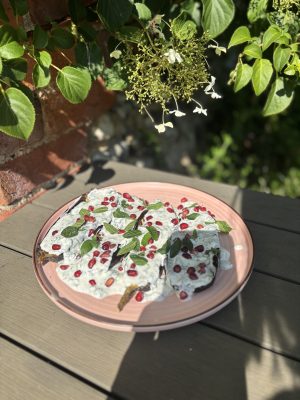Dr Philippa Kaye is a GP, author, journalist and mother. She is a Londoner and only moved away for three years while studying at Downing College Cambridge, before returning to Guy’s, King’s and St Thomas’ medical school for her clinical training. Once qualified she got married and started having babies all in the midst of training in paediatrics, gynaecology, care of the elderly and acute medicine, psychiatry and then general practice. She now works as a GP in both privately and for the NHS, before running home to the chaos of a house with a husband and three small children.
Dr Philippa knows that one of the core skills of medicine is being able to translate ‘medicalese’ into English and has used this skill to write five books on subjects ranging from pregnancy to child health and development. She is the medical expert for Woman and My Weekly Special magazines and regularly contributes to the print and online press such as The Daily Mail. She has previously been the medical expert for various magazines such as Junior, Sugar and Prima Mother & Baby and websites such as raisingkids.com. She is the current GP for the MadeForMums forum. She is also regularly on both radio and television, often on The Victoria Derbyshire show on BBC 2, BBC, ITV and channel 5 news, as well as BBC Radio London and much more!
What impact can menopause have on collagen production?
Oestrogen is involved in the production of collagen and elastin, which give skin its strength and elasticity, so as levels of oestrogen fall in the menopause so too do the levels of collagen, leading to thinner, dryer-looking skin.
Is it true that reaching menopause can increase our sensitivity to sun damage?
Yes — though we should all be looking to use sun cream daily to protect our skin whatever our age. With less collagen and elastin the skin is essentially less good at repairing itself from sun damage, and you can also get sun spots as the regulatory control of oestrogen over melanin-producing cells is lost.
Many women report that their hair and nails suffer as a result of menopause. What is this down to?
All the changes of the menopause are related to the lower levels of oestrogen, so both nail and hair can be affected. Nails become thinner and more brittle and hair can become thin, and you may experience hair loss, generally around the crown and temples.
Why does menopause often lead to weight gain, particularly around the tummy?
Oestrogen has an effect on where you lay down fat in your body, and the falling levels mean that the fat is deposited around the tummy. As you get older your basal metabolic rate falls, meaning you are more likely to gain weight.
HRT is a controversial topic, and we know there is a significant chapter on this in your book. Are you able to briefly summarise your overall view?
This is a huge question! My view is that using transdermal oestrogen (delivered through the skin) via a patch or gel, plus utrogestan or a Mirena for the progesterone component (if needed) is the safest option. For most women starting HRT within ten years of their menopause the benefits outweigh the potential risks, but this is decided on an individual basis, so please speak to your doctor.
What lifestyle factors can help women deal with the effects of menopause?
Lots and lots — everything from what you wear to what you eat and drink and how you exercise can have an impact on the effects and symptoms of the menopause.
Drinking alcohol can worsen many menopause symptoms such as hot flushes and urinary problems, and is even associated with an increased risk of developing osteoporosis as it can affect how calcium is absorbed into your bones.
Caffeine can trigger hot flushes so limiting your intake of tea and coffee can be helpful. It can also make you feel irritable, affect your sleep and worsen anxiety, so try to avoid caffeine after 5 p.m.
Smoking is linked to respiratory diseases and many cancers and increases your risk of cardiovascular disease such as heart attack and stroke. Smokers tend to go through the menopause on average two years earlier than non-smokers. It is also associated with an increased risk of developing osteoporosis, and increases the likelihood of you having hot flushes, or more severe hot flushes.
Studies show that women who do cardiovascular exercise regularly have fewer menopausal symptoms, as well as benefitting from the myriad of other health benefits related to exercise. With regard to hot flushes, studies have shown that if you are fit already, then exercise can reduce hot flushes. However. if you were unfit before the menopause, exercise may make flushes worse initially, so start slowly and gradually work your way up.
There’s lots more info in the book!
Some women struggle with sleep during menopause, which takes its toll on both wellbeing and appearance. Why is this and can you offer a piece of advice to help with this?
Sleep hygiene is very important and can help to treat insomnia. We live in a world that is always busy and full of lights, noise and stimulation and we have to turn off the noise in order to quiet our minds and relax our bodies to prepare for sleep.
◆ Create a relaxing bedtime routine before trying to sleep, and in time this will become a trigger, reminding your mind that it is time to go to sleep. For example, you could try to get into the habit of taking a warm bath, making a warm (non-caffeinated) drink or reading a book before bed.
◆ Think about the physical environment of your bedroom. Do you have a comfortable bed and pillows? Is the room too hot or too cold? It is too light or too noisy? If the answer is yes to any of those questions then what could help? For example, wearing ear plugs to block out noise or getting blackout blinds or a sleep mask if it’s too light at night.
◆ Make your bedroom a sanctuary of sleep, using your bed only for sleep and sex. If possible, don’t use your bed for working, watching TV or using your laptop and keep screens out of the bedroom (even if they are off). This will help train your mind to know that getting into bed equals going to sleep.
◆ Avoid screen time — be it the television, your phone or your tablet — for at least an hour before bedtime. The blue light from the screens disrupts your sleep pattern by sending signals to the brain suggesting that it is still light and therefore must still be daytime, so your brain does not turn on the melatonin production.
◆ Go to bed when you are tired. Possibly the most obvious statement, but actually many people try to sleep out of routine, or stay out late and then try to go straight to sleep. A period of relaxation and only going to bed when you feel sleepy will help.
◆ This one is a biggie — you need to get up at around the same time every day, including at the weekend. You don’t necessarily need to then rush around starting your day — you can rest and relax, but not in bed asleep! Try to avoid napping during the day, but if you must, limit it to 30 minutes before about 3 p.m.
◆ Exercise. There is good evidence that regular exercise, especially exercise done outside with exposure to natural daylight (at least four hours before bedtime), can help with insomnia.
◆ Avoid caffeine and other stimulants such as alcohol and nicotine for at least 5–6 hours before going to bed, for example from 5 p.m., and avoid eating heavy meals too late at night.
Self-confidence and self-esteem can take a huge knock when menopause hits. Do you have any advice on how women can continue to feel confident, attractive and relevant once they hit menopause?
The impact of the menopause, on both our physical and our psychological health in both the short and long term, should not be underestimated, but this does not mean that ‘it’s all over’. We need to keep talking about the menopause, its symptoms and its treatments, from lifestyle to medication, be it hormonal medication or not. It is only by breaking the taboo and the silence that we will be able to feel confident to ask for and get help if we need it. We need to realise that the one-third of our lives we are going to have after the menopause can be just as good, if not better than, the years before it!
Finally… where can people buy your book, The M Word?
The M Word: Everything You Need to Know About the Menopause by Dr Philippa Kaye is published by Summersdale Publishers and is available through Health and Her, and all good bookshops.
.
Why become a member of Luminous?
Subscribing to Luminous will give you access to a wealth of curated tutorials and routines to help teach you to lift and tone every part of your face. You can filter by face part to target specific areas, or try the full routines. We add new techniques and routines to the site regularly as it is important to mix up the exercises you do to keep your muscles challenged.
We do monthly online live classes which will help keep you motivated as well as ensuring you are doing the techniques correctly.
Head to the ‘Become a Member‘ page to learn more about the benefits and cost of membership!
.








